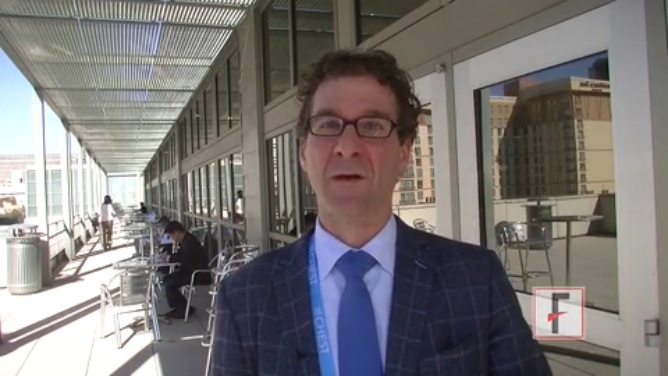User login
AUSTIN, TEX. – Why would travel restrictions make the Ebola epidemic worse in West Africa and expand its spread to U.S. shores? What can American intensive care units do to prepare, even if they aren’t designated Ebola centers? And are there lessons medical professionals and policymakers can apply from the successes and failures of the AIDS epidemic 30 years ago?
In a video interview at the annual meeting of the American College of Chest Physicians, Dr. Lewis Rubinson offered answers to those questions and perspectives on the current American response to the Ebola outbreak. Dr. Rubinson recently returned from treating more than 300 Ebola patients in Sierra Leone as a consulting physician for the World Health Organization.
“Honestly, I think if we don’t get it under control in the next few months in West Africa, there will be sporadic cases coming back [to the United States] for as long as we can think of,” cautioned Dr. Rubinson, director of the R. Adams Cowley Trauma Shock Center at the University of Maryland, Baltimore.
On Twitter @whitneymcknight
The video associated with this article is no longer available on this site. Please view all of our videos on the MDedge YouTube channel
AUSTIN, TEX. – Why would travel restrictions make the Ebola epidemic worse in West Africa and expand its spread to U.S. shores? What can American intensive care units do to prepare, even if they aren’t designated Ebola centers? And are there lessons medical professionals and policymakers can apply from the successes and failures of the AIDS epidemic 30 years ago?
In a video interview at the annual meeting of the American College of Chest Physicians, Dr. Lewis Rubinson offered answers to those questions and perspectives on the current American response to the Ebola outbreak. Dr. Rubinson recently returned from treating more than 300 Ebola patients in Sierra Leone as a consulting physician for the World Health Organization.
“Honestly, I think if we don’t get it under control in the next few months in West Africa, there will be sporadic cases coming back [to the United States] for as long as we can think of,” cautioned Dr. Rubinson, director of the R. Adams Cowley Trauma Shock Center at the University of Maryland, Baltimore.
On Twitter @whitneymcknight
The video associated with this article is no longer available on this site. Please view all of our videos on the MDedge YouTube channel
AUSTIN, TEX. – Why would travel restrictions make the Ebola epidemic worse in West Africa and expand its spread to U.S. shores? What can American intensive care units do to prepare, even if they aren’t designated Ebola centers? And are there lessons medical professionals and policymakers can apply from the successes and failures of the AIDS epidemic 30 years ago?
In a video interview at the annual meeting of the American College of Chest Physicians, Dr. Lewis Rubinson offered answers to those questions and perspectives on the current American response to the Ebola outbreak. Dr. Rubinson recently returned from treating more than 300 Ebola patients in Sierra Leone as a consulting physician for the World Health Organization.
“Honestly, I think if we don’t get it under control in the next few months in West Africa, there will be sporadic cases coming back [to the United States] for as long as we can think of,” cautioned Dr. Rubinson, director of the R. Adams Cowley Trauma Shock Center at the University of Maryland, Baltimore.
On Twitter @whitneymcknight
The video associated with this article is no longer available on this site. Please view all of our videos on the MDedge YouTube channel
AT CHEST 2014
